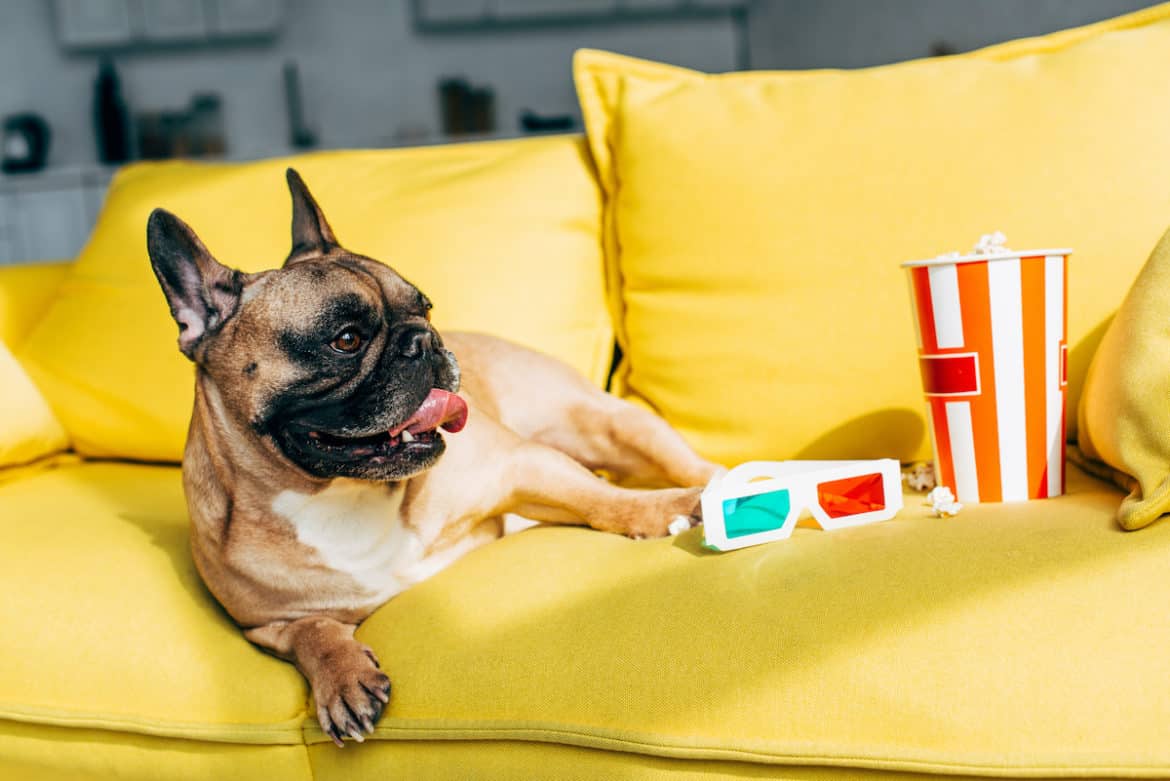Dogs absolutely love a tasty snack (don’t we all?). It can be very difficult to say no to your dog when they want a particular food item you have since the puppy dog eyes tend to melt our hearts and we give in.
There are so many treats that are safe for your dog to consume, however, there are equally as many that can be harmful, particularly those of the human snacking variety.
So, can dogs eat Smartfood popcorn? No, you should not let your dog eat Smartfood popcorn. It is high in sodium and fat which could have some health implications for your dog. There is also always a possibility that the kernels could get stuck in your dog’s teeth which can cause dental problems or become a choking hazard.
In this guide we’ll go over why Smartfood popcorn isn’t great for your dog and the risks of feeding it to your pet, as well as some safe alternative treats for your pooch.
Risks of Feeding Your Dog Smartfood Popcorn?
There are many types of foods on the market which are not safe for consumption by our canine friends. Popcorn is one of those snacks which can potentially cause harm for your pooch.
It isn’t a particularly healthy treat for humans and therefore even less so for dogs. Some key reasons why Smartfood popcorn would not be a great treat for your dog are:
- High sodium levels – which can cause severe dehydration.
- High oil levels – which can be fattening and cause obesity.
- Kernels – which can potentially be a choking hazard.
Let’s take a closer look at the key reasons why you should not feed Smartfood popcorn to your pooch in more detail.
Sodium (Salt) Levels
Sodium (salt) levels in Smartfood popcorn is very high. A much higher dose than is required for the optimal nutritional health of your dog.
Too much salt for dogs can be deadly. At extreme levels, it can severely dehydrate your dog. Especially if your dog does not always drink enough water, extra salt can cause your dog some very serious problems.
Even in smaller amounts super salty snacks are not good for your dog. Your dog needs a balanced diet with only so much salt. Veterinarian dog food will already be formulated to ensure your pooch has the right balance of nutrients. Adding a salty snack can throw that off.
Oil (Fat) Levels
Smartfood popcorn contains a high level of oil (fat) which is over the limit for dogs. Your canine friend will usually receive all the fat they need from their regular food diet to keep them fit and healthy.
Popcorn, unfortunately, takes them over that limit which can cause complications. Dogs that have a high-fat diet are almost certainly prone to becoming overweight or even obese, which can cause other health complications. It is in your pooch’s best interest to ensure they are kept to a healthy diet.
Kernels
If you have ever had a splurge on some popcorn yourself you will be familiar with the fact that there is usually some evidence in the bag to suggest some of the kernels have not popped successfully.
This is commonplace with popcorn and an instance that can be pretty dangerous for your dog. Dogs will quite happily eat the kernels in whole pieces without realizing the risks.
Popcorn kernels can upset your dog’s stomach. The kernels are also likely to get stuck in your dog’s teeth and can be a very serious choking hazard for your pooch.
What Can I Feed My Dog As a Treat Instead?
There are fortunately plenty of other foods that you can feed to your dog instead of popcorn. Although dogs seem to love the taste of popcorn, it is really not a safe treat for them.
Some of the very best treats can easily be bought from your local pet or grocery store and have been specifically designed for dogs in mind. This means they are perfectly safe for your dog to consume, although you will likely need to be sparing with them even if you choose more nutritious options.
For dogs, just as with people, treats are not a replacement for a healthy balanced diet! Some of the key things to consider when choosing a dog treat are:
- The lower the fat and oil content the better. Likewise, go for treats with lower levels of salt/sodium. Dogs don’t need excess amounts any more than we do!
- Avoid treats that are high in calories or which contain sugar. Sugar is bad for dogs.
- Wheat, soy, and corn should ideally be avoided, particularly for dogs with allergies.
- Most peanut butter is safe for dogs, but not sugar and absolutely not chocolate! Make sure any peanut butter treats are made with dogs in mind and with very little sugar. People treats will almost certainly not be good for your dog.
- Meat by-products should be avoided; try to stick to pure meats which have a much higher nutritional value. (If you are going to treat your pooch with a little of your own dinner, give them a small portion which is unseasoned. It may be easiest to do this just after cooking and before combining ingredients or adding sauces.)
- Natural treats often contain more nutritious ingredients without any unnecessary fillers and grains, but you should still check them to be safe.
- Always make sure treats are the correct size for your dog – some treats are too large in size for puppies and could end up being a choking hazard.
Up Next: 3 Best Popcorn Treats For Dogs
